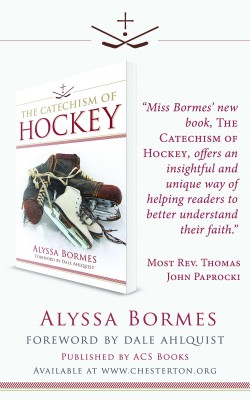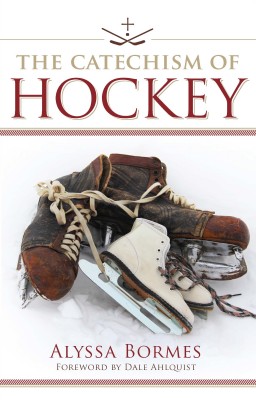This month, we’re pleased at CatholicMom.com to have site sponsorship from The American Chesterton Society, the publisher of The Catechism of Hockey by Alyssa Bormes. Today, I share my recent conversation with Alyssa about this one of a kind book. On Facebook yesterday, one of our contributors was sharing that she is having her 10 year old, hockey-playing son read this book aloud in the car en route to school. Both are loving it -- as I did! I hope you enjoy this interview with Alyssa Bormes and that you'll check out The Catechism of Hockey for yourself! LMH
Q: Please briefly introduce yourself and your family to our readers.
Thank you. My name is Alyssa Bormes. Perhaps you could say that I came from a family of storytellers, and we honed our skills around the family dinner table. I am the youngest of eight children. By the time I began telling stories with my family, they all had much more practice because they were older. This became an incentive for me to learn to craft better stories – in search of a great reaction from the ready-made audience of my siblings and parents. Another gift from the family dinner table was that of analogy. My father often used analogies to explain the complex. Storytelling and analogy became my breath.
Currently, Minneapolis, Minnesota is home. Holy Family Catholic Church in St. Louis Park is my parish. My mother and step-dad live in South Dakota. (My father died in 1991.) My sister and niece live down the street, which is a treat. My brother John often visits – everyone should have a brother John – he has offered so much support through the whole writing of the book. My other family members are scattered throughout the Midwest. My mother married a widower; he has nine children. My nine stepsiblings are scattered around the nation and in Japan. I don’t know that I have ever had an accurate count on how many nieces and nephews I have. There are a lot of us – we have all been together twice – and it is a great joy.
Because of the topic of the book, people often assume that I am a hockey mom myself. However, I am single, and have no children, and only rarely do I have the opportunity to go to the rink to watch my friends’ children play hockey. I do love hockey – as I love many sports – and hockey just happened to be the thing that popped into my head.
Q: How did you first conceive the idea for The Catechism of Hockey? Please give our readers a basic summary of the book.
Ah – yes, the idea. Sometimes it still surprises me!
One night in March of 2007, I was lying in bed pondering the idea of sports as a religion. It seems that nearly everyone admits that sports have become their own religion. However, I had never heard a good reason as to why they have become a religion. In what can only be described as a poof, I had nearly the whole idea of The Catechism of Hockey.
In that poof, I understood that we fully catechize our children in sports. Our whole lives are infused with all things sports. We pick our teams for our children at birth – for example, everyone in the family is a fan of the Minnesota Gophers. The baby is wearing a Gopher onsie. There is a Gopher blanket on the couch, the Gopher game is on the television, and one of the kids gets to go with Grandpa and Grandma to the game. We teach the rules of the game to our children from their youngest years. We teach them how to skate, or throw a ball, or bat as soon as they are able. Then they are sent off to the coaches for a deeper teaching, and they begin to play organized sports. They understand what it is to be a part of a team. They even understand that they are a part of the bigger sport – the sport as a whole. This especially happens as we teach them about the great players who have gone before them.
To catechize is to faithfully echo the teachings of something. In our families, we really do echo faithfully the teachings of sports. This is done both physically and mentally. You might even say that we include the soul when we ask our children to put their hearts into it. We rarely question if our children will remain faithful to sports when they go off to college, and later have their own families. Of course they will – they have been fully catechized in sports, which nearly always leads to them wanting more sports.
It is this sports catechesis that I use as an analogy for the catechesis that needs to take place in the Faith. The Catechism of Hockey looks at the teachings of the Catholic Church. The book begins with the Deposit of Faith, then moves to things like the Magisterium, disciples, Sacraments, vocations, the Eternal Crown of Glory, the Communion of Saints, and more. Subjects like suffering, docility to teaching, modesty, waiting for marriage for physical relations, and even contraception are met head on. And – all through the lens of sports - not just hockey, but many sports – even ballet and piano make an appearance. Oh – so does Elvis!
The thing is – you don’t need to know a thing about hockey – you will easily be able to see the connections to the Faith.
Q: So hockey and faith, huh? What's the value in making the analogy between something as accessible as hockey and something as seemingly complex as our Catholic Church?
This is exactly the point. The things that are accessible in life should be used to explain the Faith. Sports is the language of so many – not just of individuals, but also of families, of communities. In The Catechism of Hockey, the “simple” language of sports is used to open the vast and beautiful teaching of the Catholic Church.
Perhaps in my life, one of the greatest gifts was being invited to sit among the scholars during my Master’s program. The language of the scholars was far above my ability to understand. But my professors kept inviting me; the tool they used was analogy. They were able to help me understand the complex – showing how, in a way, it was beautifully simple.
In another light, there could be a case made for hockey, or any sport, being complex. There are the nuances of the rules, the complexity of the plays, the speed, the quick reactions and direction changes, the split second decisions that can win or lose games. To the new fan or new player, there is just so much going on at once, and it is hard to take in. But to the seasoned, or catechized, fan or player, the game has become simple and pure because of the understanding of the whole.
The language of sports is only “simple” because we understand it. And the language of the Church is only complex when we don’t understand it. To speak in terms of sports, even if it is hockey, can be the very thing needed to touch the souls of our neighbors.
Q: Help a California mom out here... I'll admit that the whole blue line thing confuses me! What's your hope for those families who read your book in terms of what they will learn about their faith lives?
If the blue line of hockey is confusing, just replace it with the white lines of a football field, or tennis court. Then inside those white lines, are more white lines. Take a look at the lines of the basketball court, or soccer field. Some of the inside lines are really curves. On a wrestling mat, it is all curves.
What are the lines about? Simply, boundaries.
We welcome the boundaries of a given game because they give us a space and manner in which to play the game. We don’t even question the boundaries – but some authority had to decide what constitutes boundaries, what is inside the boundaries, and what is outside of them. Oddly enough, greatness in a given game always is found from within the boundaries. There is no greatness in breaking the boundaries – instead there is greatness in keeping the boundaries.
My hope for families, for everyone really, is that they understand the why of the boundaries that the Church gives us. The boundaries offer a manner in which to live life. And the greatness, like the greatness of the Saints, comes from within the boundaries – from within the Commandments and teachings of Mother Church.
To watch a hockey game, or football game, where the rules are discarded – the boundaries of the lines, and those of the rules – soon diminishes to chaos. Chaos is not beautiful. An athlete who is above the rules becomes a distraction. The fans and teammates tire of the offending player. Athletes who attempt to make their own rules will often find themselves excused from the game. Even the greats still follow the rules – it’s one of the reasons they are so great. They excel from within the rules!
It seems that one of the reasons we love sports so much is precisely because of the rules. In sports it is clear what is allowed and not allowed. Right and wrong are the same in the minds of everyone - players, coaches, referees, and fans. Only the person who has been un-catechized in the sport is confused.
Not only do I hope that families understand the need for boundaries and rules in the Faith, but also, I hope that they can reach other members of their families who don’t agree with the Church. In addition, sports are beautiful; my hope is to use their beauty to explain the beauty of the Catholic Church.
 Q: What are you hearing from friends and family about their response to the book?
Q: What are you hearing from friends and family about their response to the book?
Well, the very first book went to my mother. She did say that if Bishop Dudley were still alive, he could have the first book. I told her that if he were still alive, he would think it only right to give my mother the first book. When I gave her that book, I didn’t have many on hand yet, as the printing wasn’t finished. So I told her that more would come later. Without missing a beat – she told me, “Yes, but I have to give one to Father.” So the second book went to her priest. Of course, my mother loves the book.
Beyond my mom, still the response has been amazing. Just last Sunday at donuts after Mass, a friend shared his thoughts about the book. Now, he is a good friend, so his words may have been a bit inflated – but here goes. He told me that he had high expectations for the book, but that the book had far exceeded his expectations. It was high praise coming from him, as he is also an author.
The other phenomenon that has happened is the customer who has purchased and read one book, now wants ten more. It is the sort of book that you can give away without having it seem preachy. The Catechism of Hockey is part apologetics, part hilarious, part gripping, and part a call to parents to be the first teachers of the Faith – as they already are in sports. Among many things, it is a call to fathers to be the spiritual head of the family. The book seems to resonate with dads, which is so pleasing – as sometimes they get left out.
Among her 17 children, my mother claims two others; one of them is a priest. He told me that he has already used examples from the book in homilies. Another friend teaches theology at a University. He has used examples from the book in his classes. Perhaps all of this is because the book is written in the common language of all of us – it is written right from the heart.
Q: How has the writing of this book impacted your own spiritual life and your relationship to the Catholic Church?
What a fantastic question! This really is the book of four shoulder surgeries. I thought of the book just before the first surgery, began writing while recuperating from the second, finished the fourth draft by the third surgery, and began working with an editor during the fourth surgery.
My beloved spiritual father was Bishop Paul Dudley, of happy memory. He taught me to have an intention for suffering – a little intention for little sufferings, and a big intention for big sufferings. Each time before a surgery, I offered my intentions for the suffering. They were smaller intentions included – but the big intention for each surgery was for the priesthood. I was away from the Church for 17 years – and Bishop Dudley and other priests brought me home. So the suffering was offered in thanksgiving for my priests – and the priesthood as a whole.
What I found out was that somehow, out of seemingly nowhere, I had a book in my hands. Praying for my priests made me less sorry for myself. Praying for them gave me the courage to sit hour after hour with an arm that could only be plopped onto the keyboard in my lap, and to write down what had been given to me in that poof in 2007. There were days when the blank page was terribly intimidating, but offering even that suffering for the priesthood pushed me forward.
I suppose that my greatest spiritual lesson from writing this book is a new understanding of redemptive suffering. Yes, everything can hurt, even my heart – but today is a perfect day to do what God has asked me to do.
Thank you also for asking about my relationship to the Catholic Church. In one of the first chapters, I use a story about being in line with four million other people to view the body of Pope John Paul II. It was in this line that I really learned what the Mystical Body is. Writing this book has only reinforced the lesson.
It is humbling to think that words written while sitting in a coffee shop with one lame arm somehow are meaningful to someone across the country. For example, one of my stepsisters called me from Washington State to tell me of what the book has set in motion in her parish. This sense of the Mystical Body has made me understand, in a beautiful way, my smallness. The Church is universal – and the universality is much bigger in my mind now than before. I am just one simple voice – but He has asked me to use my voice. God willing, even one voice can have an impact. My desire is to find souls – and lead them to Christ and His Church.
Q: Are there any additional thoughts or comments you would like to share with our readers?
The book may use the language of sports, but it is peppered with stories that speak to the heart of everyone. One of the first stories is that of my dad teaching me how to skate, and my own shock when my feet would run into each other. And there are stories, as mentioned above, about being in line to view the body of JPII – another of being at the vigil when he died. There are stories of the wounded pride of a teenager, the joy of a grandfather teaching his granddaughter a new David and Goliath story, and the universal stories of suffering and joy.
This book is not so much about sports as it is about the soul. And – I suppose that what I learned around the family dinner table those many years ago was that stories that grip the soul are the best stories of all.
- Order or learn more about The Catechism of Hockey
- Check out The Catechism of Hockey in Kindle Format
- Follow the American Chesterton Society: Website, Twitter, Facebook, Pinterest, Youtube
Be sure to check out our Book Notes archive.
Copyright 2013 Lisa M. Hendey
About the Author

Lisa M. Hendey
Lisa M. Hendey is the founder of CatholicMom.com, a bestselling author and an international speaker. A frequent radio and television guest, Hendey travels internationally giving workshops on faith, family, and communications. Visit Lisa at LisaHendey.com, on her Substack at LisaHendey.Substack.com, or on social media @LisaHendey for information on her speaking schedule or to invite her to visit your group, parish, school or organization. Find Lisa’s books on her Amazon author page.





.png?width=1806&height=731&name=CatholicMom_hcfm_logo1_pos_871c_2728c%20(002).png)
Comments